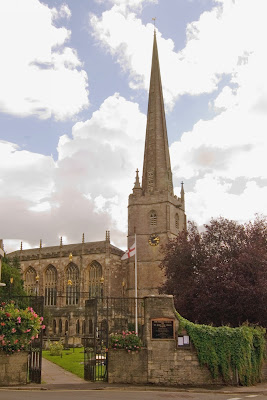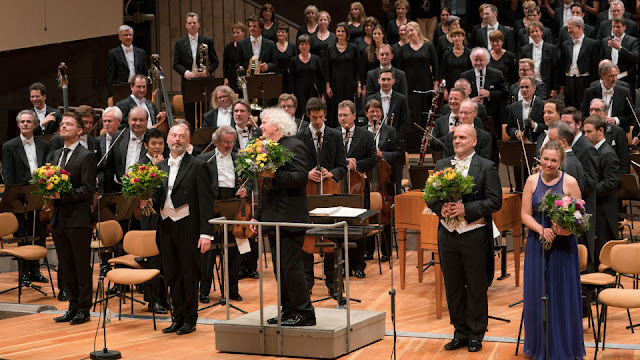 |
| Mark Padmore & Till Fellner performing in Japan (Photo by kind permission of Izumi Hall, Japan - photographer credit Satoaki Hikawa) |
 |
| Mark Padmore (Photo Marco Borggreve) |
His recital at the festival is very much in two halves, in the first Schubert and in the second Schumann's Dichterliebe, a real stand-alone work. Mark describes Dichterliebe as one of the most extraordinary works of the repertoire, but he clearly has a very clear view of the piece as he goes on to describe it as a piano piece with vocal accompaniment. Schumann wrote Dichterliebe in 1840 as part of his astonishing year of lieder writing. Mark sees the songs as messages to Clara (whom Schumann married in 1840), and feels that you can tell that Schumann was writing them for a pianist (Clara Schumann was one of the most distinguished pianists of the Romantic era). So whilst the vocal lines deliver the text, the piano carries the most important music particularly in the piano postludes.
For the first half of the concert Mark and Till are performing Schubert songs, a selection which mainly includes later songs including settings of Seidl and Leitner. Mark finds this later period of Schubert's song writing extraordinary rich, as in the last couple of years of his life he became a real master of the art form. Mark says that he finds songs from this period increasingly interesting to perform, especially the not so well known songs and feels that some are some of the greatest music for voice and piano. He adds that it is lovely to be able to explore music with interesting piano parts with Till Fellner, who is a distinguished pianist in his own right.
 |
| Parish Church of St Mary, Tetbury |
In Dichterliebe Schumann set the poetry of Heinrich Heine, a poet whom Schubert set in his final cycle Schwanengesang. I was interested to find out how Mark thought about the differences between Schumann and Schubert's approach to this poet. Mark first of all comments on a pair of fascinating co-incidences, Schubert was born the same year as Heine and Schumann died the same year as Heine. So that Heine's life encompasses the lives of both composers.
Schubert came to Heine's poetry rather late and only set the six poems in Schwanengesang. They are all extraordinary songs, but it is easier to look at Schubert's relationship to other poets like Goethe, as Schubert built up a significant body of Goethe settings. Also Mark feels that Schubert did not go into the famous Heine irony. Schumann, on the other hand, had a taste which was more literary; Schumann's father was a bookseller, and literature was an essential part of Schumann's life, he was a prolific writer of music criticism. So Schumann connected with Heine's irony.
The poems in Dichterliebe might not seem an obvious gift to the woman you are marrying, but Mark thinks you need to put the cycle into context. It is true, they did eventually marry, but 1840 was a year of tension and after the immense struggle with Clara's father there was the worry that he might spirit Clara away before they had chance to marry. You can feel this in some of the songs, the sense Schumann was worried his beloved might marry someone else in Ein Jüngling liebt ein Mädchen and the same sentiment crops up in the Eichendorff Liederkreis and the Hans Christian Anderson settings from the same year.
In Tetbury, of course, Mark will be singing in German to a predominantly English-speaking audience, whereas during his Berlin Philharmonic residency he will be singing in German to Germans, so I was interested to find out if Mark felt that there was much of a difference. Communication of the text is important to Mark, and he finds it wonderful to be putting texts across to audiences in their mother tongue. He calls himself a very text based singer, concerned to reach the audience with ideas and thoughts, so he feels that it is more rewarding for the audience if they have a some sort of grasp of what is going on in the text.
Another interesting aspect of his Berlin residency is that he will be performing a programme of English song, including RVW's Blake Songs (for voice and oboe) and Warlock's The Curlew (for voice, flute, cor anglais and string quartet). When I comment that I don't know what its like singing English song to a German audience, Mark's immediate response is 'nor do I!'. He feels that the advantage of a residency like this is that he gets to work with the players, and meet them on a different level rather than just jetting in for a concert. So for the English song recital he will be working with the Berlin Philharmonic instrumentalists, and is intrigued to find out how they respond to the songs. He will be talking to the players to see how they understand the songs and the poetry.
Mark finds it enormously important when performing a works in English (like Britten's Serenade for tenor, horn and strings) that he is able to talk to the orchestral players about the text, but too often players do not have the text and have not read the poems.
 |
| Berlin Philharmonic, Sir Simon Rattle, Elsa Dreisig, Mark Padmore, Florian Boesch (Photo Berlin Philharmonic) |
Looking further ahead, Mark will be premiering a new piece by Thomas Larcher at the 2018 Bregenz Festival. Mark has not seen the new piece yet, but Larcher is a composer whose work Mark likes very much and Mark thinks he has a wonderful understanding of sound. Larcher wrote his Padmore Cycle for Mark, first with piano accompaniment and later orchestrated, in which version Mark has performed it a few times including with the BBC Symphony Orchestra and with Edward Gardner and the Bergen Philharmonic Orchestra. And Larcher's Third Symphony was performed at the BBC Proms last year by Semyon Bychkov and the BBC Symphony Orchestra (see Tim Ashley's review in The Guardian). The new work is a setting of a Japanese novella, The Hunting Gun by Yasushi Inoue.
Another highlight of next year will be Mark's performances in Bach's St Matthew Passion with the Orchestra of the Age of Enlightenment, when Mark will be singing the role of the Evangelist as well as directing the performance
For all of Mark's performances, see the Events page of his website.
Elsewhere on this blog:
- Familiar & unfamiliar: The Tallis Scholars open the 10th Choral at Cadogan series - concert review
- Charminglly inventive: Carolyn Sampson and Da Camera in Telemann - Concert review
- Bach to the piano: Recordings of Bach on the piano - CD review
- Zany, surreal vaudeville: Mozart vs Machine from Mahogany Opera Group - opera review
- Far from dry: Vox Luminis in music by Bach, his forbears & older contemporaries - Concert review
- Debut recital: Subito! from Julia Hwang - CD review
- The first Englishwoman to sing Brunnhilde at Bayreuth: Our interview with Catherine Foster - interview
- Late flowering: John Joubert's Missa Wellensis and St Mark Passion from Wells - CD review
- Ancient and modern: New music for choir and ancient instruments from the choir of Gonville and Caius College - CD review
- Mozartian influences: Salieri's La scuola de' gelosi from Bampton Classical Opera - opera review
- The Art of Dancing: New concertante works for trumpet, piano and strings - CD review
- From curiosity to charm: A portrait of Felicien David - CD review
- Home











No comments:
Post a Comment